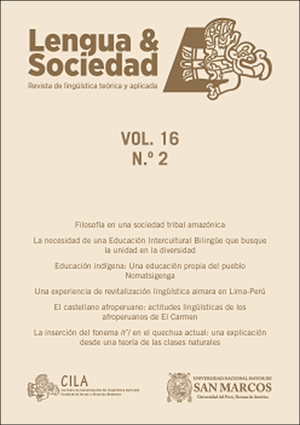Philosophy in an Amazon tribal society
DOI:
https://doi.org/10.15381/lengsoc.v16i2.22372Keywords:
Desana, Colombian Amazon, philosophical thought, worldview, religionAbstract
«Philosophy in an Amazon tribal society» shows how the anthropologist Gerardo Reichel-Dolmatoff evidences a philosophical thought, both at the level of philosophical concerns shared by ordinary people, as of a more elaborate reflection of the healers among the desana of the Colombian Amazon. This testimony about a tribal society clearly shows that the healers with their philosophy expressed in abstract concepts, are the ones who establish the worldview and religion as instruments of social management and self-government, and not the other way round as it is often assumed that religion precedes philosophy. We are talking, however, about a top secret knowledge that reflects the interests and power of the healers and gives a completely different view of their culture, not accessible to most of its members. And this gives us the opportunity to establish the relations between philosophy and political power in different types of societies. What begins as a question about whether Amazonian peoples have an own philosophy ends by discussing the nature of philosophical reflection itself.
References
Aristóteles. (1978). Metafísica. Buenos Aires: Sudamericana.
Austin, J. L. (1962). How to Do Things with Words. England: Oxford University.
Burga, E. (2012). Reflexiones y desafíos a la Educación Intercultural Bilingüe desde los pueblos indígenas amazónicos. En Articulando la Amazonía. Una mirada al mundo rural amazónico. Lima: AECID.
Feyerabend, P. K. (1986). Tratado contra el método. Esquema de una teoría anarquista del conocimiento (Trad. D. Riba). Madrid: Editorial Tecnos. (Trabajo original publicado en 1975).
Hegel, G. W. F. (1971). Lógica (Trad. A. Zozaya). Madrid: Ricardo Aguilera Editor.
Heise, M. (Comp.). (2001). Interculturalidad: Creación de un concepto y desarrollo de una actitud. Lima: FORTE-PE.
Helberg Chávez, H. (enero, 2018). La libertad creativa como principio social. Amazonía, 5(13).
Helberg Chávez, H. (enero, 2018). Reflexiones para mejorar la Educación Intercultural Bilingüe. Amazonía, 5(12).
Helberg Chávez, H. (2017). Las carreras interculturales en el centro de la discusión política y académica.
Helberg Chávez, H. (2017). Conocimiento intercultural. Indicaciones metodológicas. Lima: Sur.
Helberg Chávez, H. (2015). La gestión del conocimiento, los pueblos indígenas y el poder. Desde el Sur, 6(2). 11–23.
Helberg Chávez, H. (2014). Interkulturelle Epistemologie. [Epistemología Intercultural]. Concordia, Revista Internacional de Filosofía, 64.
Helberg Chávez, H. (2012). Aufgeklärte Praxis: Philosophie für das 21. Jahrhundert [La praxis lúcida: Filosofía para el Siglo XXI]. Concordia, Revista Internacional de Filosofía, 62.
Helberg Chávez, H. (2012). Cambio de época. Revista Solar, UNMSM.
Helberg Chávez, H. (2008). Epistemología de la interculturalidad latinoamericana. El Vuelo de la Luciérnaga, 1.
Helberg Chávez, H. (1996). Mbaisik. En la penumbra del atardecer... Literatura Oral Harakmbut. Lima: CAAAP.
Heller, E. (1959). Ludwig Wittgenstein. Unphilosophische Betrachtungen [Folleto]. Merkur, Heft 142. (Reproducido como encarte en la edición Suhrkamp de Über Gewissheit, de Ludwig Wittgenstein, Frankfurt am Main, 1970).
Lao Zi. (1994). El libro del Tao (Trad. Juan Ignacio Preciado, edición bilingüe). México: Alfaguara.
Reichel-Dolmatoff, G. (1971). Amazonian Cosmos. The Sexual and religious Symbolism of the Tukano Indians. Chicago/London: The University of Chicago.
Reichel-Dolmatoff, G. (1975). The Jaguar and the Shaman: A Study of Narcotic Drugs among the Indians of Colombia. Philadelphia: Temple University Press.
Reichel-Dolmatoff, G. (1968). Desana. Simbolismo de los Indios Tukano del Vaupés. Bogotá: Universidad de los Andes.
Reichel-Dolmatoff, G. (1981). Brain and Mind in Desana Shamanism. Journal of Latin American Lore, 7(1), 73-98.
Searle, J. (1969). Speech Acts. Cambridge: Cambridge University Press.
Sobrevilla, D. (1992). ¿Pensamiento filosófico o pensamiento mítico precolombino? En Teresa Martínez (Coord.), Busquedas de la filosoía en el mundo de hoy (pp. 163-208). Cusco: Centro de Estudios Regionales Andinos Bartolomé de las Casas.
Winch, P. (1972). Ethics and Action. London: Routledge & Kegan Paul.
Wittgenstein, L. (1953/2001). Philosophische Untersuchungen (Kritisch-genetische Edition). Frankfurt am Main: Suhrkamp Verlag.
Wittgenstein, L. (1988). Investigaciones filosóficas (Trad. A. García y U. Moulines). Barcelona: Grijalbo.
Wittgenstein, L. (1978). Bemerkungen über die Farben / Remarks on Colour (Ed. G. E. M. Anscombe; trad. Linda L. McAlister y Margarete Schättle; edición bilingüe). Berkeley / Los Angeles: University of California Press.
Wittgenstein, L. (1975). Bemerkungen über Frazers «The Golden Bough» (Vorbemerkung von Rush Rees). En Die soziaklwissenschaftliche Relevanz von Wittgensteins Sprachphilosophie. Frankfurt a.M.: Suhrkamp.
Wittgenstein, L. (1970). Über Gewiβheit (Ed. G. E. M. Anscombe y G. H. von Wright). Frankfurt a.M.: Suhrkamp Verlag,
Zhuang-Zi: Selected Chapters (Lin Yutang’s translation of the Chuang–tzu). The World Wide Web Library.
Downloads
Published
Issue
Section
License
Copyright (c) 2017 Heinrich Helberg Chávez

This work is licensed under a Creative Commons Attribution 4.0 International License.
AUTHORS RETAIN THEIR RIGHTS
a. Authors retain their trade mark rights and patent, and also on any process or procedure described in the article.
b. Authors can submit to the journal Lengua y Sociedad, papers disseminated as pre-print in repositories. This should be made known in the cover letter.
c. Authors retain their right to share, copy, distribute, perform and publicly communicate their article (eg, to place their article in an institutional repository or publish it in a book), with an acknowledgment of its initial publication in the journal Lengua y Sociedad.
d. Authors retain theirs right to make a subsequent publication of their work, to use the article or any part thereof (eg a compilation of his papers, lecture notes, thesis, or a book), always indicating its initial publication in the journal Lengua y Sociedad (the originator of the work, journal, volume, number and date).






